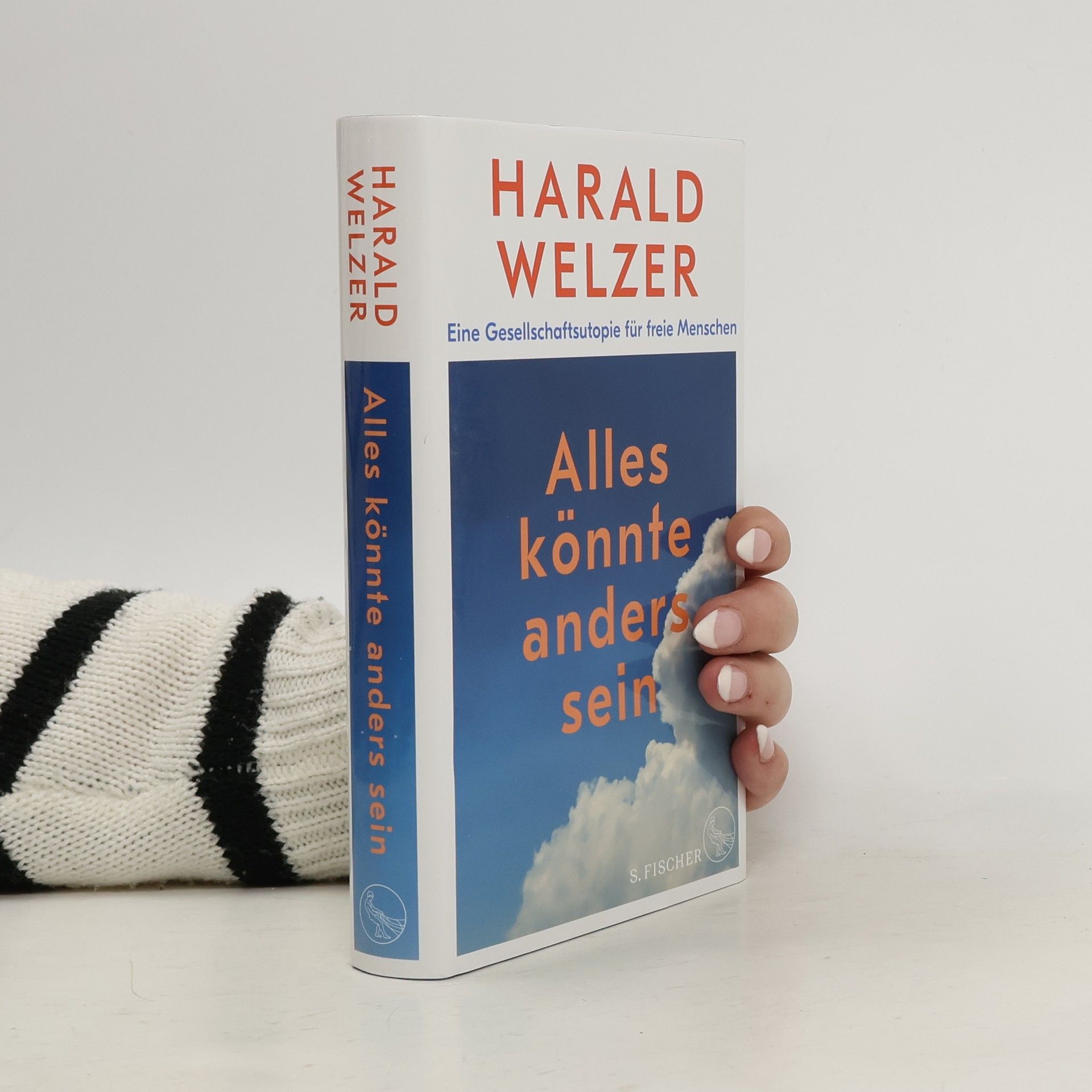Wir wohnen in unseren Gefühlen wie in Häusern. Bestseller-Autor Harald Welzer zeigt: Gefühle spielen die entscheidende Rolle bei all unseren Entscheidungen, die eben nicht nur mit Informationen und Wissen zu tun haben, sondern vor allem mit dem Zusammenspiel aller Faktoren, die von der Geburt bis zum Erwachsensein unser Ich herausbilden. Diese bestehen aus Orten, aber genauso aus Tönen, Gerüchen, Worten, Träumen, Erlebnissen, Geschichten, Gemeinschaft und anderem mehr: all dies bildet die innere Landschaft, von der aus wir in die Welt gehen und sie gestalten. Das Haus der Gefühle hat eine Statik, die kann stabil sein oder fragil. Aber es ist nicht weniger real als ein Haus aus Stein oder Beton. Seine Bausteine sind Resonanz, Heimat und das Gefühlsverlangen nach anderen Menschen. Es braucht, wie Harald Welzer in einer faszinierenden Zusammenschau psychologischer, neurowissenschaftlicher und soziologischer Befunde (und angereichert mit vielen Geschichten) zeigt, eine stabile Architektur der Gefühle. Heute mehr denn je. Im Augenblick ist Angst in unserer Gesellschaft vorherrschend. Und das ist leider ein sehr dominantes Gefühl, das sich leicht anheizen und politisch ausbeuten lässt. Als Gegenpol können Liebe, Freundschaft, Sorge und Zugewandtheit fungieren, die wir ebenso als starke politische Kräfte verstehen lernen sollten.
Harald Welzer Book order (chronological)
Harald Welzer is recognized for his interdisciplinary research on memory and social psychology. His work often delves into the societal and political dimensions of contemporary life, examining how collective memories and historical traumas shape present events. His analytical approach and ability to connect diverse fields establish him as a prominent voice in current discourse. Welzer's writing is characterized by a sharp intellectual inquiry into complex social phenomena, lending his texts a profound resonance.







Our culture has no concept of stopping. We continue to build motorways and airports for a future in which cars and planes may no longer exist. We're converting our planet from a natural one to an artificial one in which the quantity of man-made objects - houses, asphalt, cars, plastic, computers and so on - now exceeds the totality of living matter. And while biomass continues to decline due to deforestation and species extinction, the mass of man-made objects is growing faster than ever. We're on a treadmill to disaster. To get off this treadmill, argues Harald Welzer, we need to learn how to stop: as individuals and as societies, we need to stop doing what we're doing and say 'enough'. We find it hard to do this because our culture has trained us to regard endless escalation as desirable and we're reluctant to surrender the material benefits of growth. But as long as the expansive cultural model continues to prevail, there will be no change of course in favour of sustainable and climate-friendly practices and lifestyles. We need a cultural model in which the beauty of stopping is given the recognition needed for the project of civilization to continue. Optimising processes that are heading in the wrong direction only makes matters worse. Stopping is imperative: it as a human cultural technique that we must re-learn. Only then can we achieve a new beginning.
Zeiten Ende
Politik ohne Leitbild, Gesellschaft in Gefahr
Sinkende Wahlbeteiligung, Kirchenaustritte, fallende TV-Quoten und Zeitungsauflagen zeigen, dass viele Menschen sich von der politischen und medialen Öffentlichkeit in Deutschland nicht mehr angesprochen fühlen. Multi-Krisen und eine marode Daseinsvorsorge – im Schienenverkehr, in Schulen und der Verwaltung – erhöhen den Stress der Bürger. Das Erbe von vier Jahrzehnten neoliberaler Fehlsteuerung wird als Erosion der materiellen und mentalen Infrastrukturen sichtbar. Angriffe auf Polizisten, Ärzte und Zugbegleiter wirken in diesem Kontext zynisch, während Kinder keinen ordentlichen Unterricht erhalten und öffentliche Einrichtungen verfallen. Die Enttäuschung über eine Politik, die ihre Wähler aus den Augen verliert, wächst, insbesondere angesichts der unzureichenden Maßnahmen gegen den Klimawandel. Die Regierung beschäftigt sich mit veralteten Positionen und simuliert Konzepte in endlosen Gipfeltreffen, während sie Ideenlosigkeit mit Moralismus kompensiert. Ein Mediensystem, das mehr am Schauwert als am gesellschaftlichen Gelingen interessiert ist, unterstützt diesen Zustand. Das Buch thematisiert die Fahrlässigkeit und Arroganz einer politischen und medialen Klasse, die die wachsende Distanz zur Bürgerschaft ignoriert und den Kontakt zur sozialen Realität verloren hat. Es ermutigt alle Empörten, nicht länger still zu bleiben.
In ihrem ersten gemeinsamen Werk untersuchen die Bestseller-Autoren Richard David Precht und Harald Welzer, wie Massenmedien die Demokratie gefährden. Oft weichen die Berichterstattungen der Medien von den Ansichten großer Teile der Bevölkerung ab, insbesondere bei brisanten Themen. Dies führt zu dem Eindruck, dass die Medien in Deutschland von der Regierung manipuliert werden. Doch die Realität ist komplexer: Die Medien sind nicht Werkzeuge staatlicher Meinungsmache, sondern agieren aus einer eigenen Perspektive, die zunehmend einseitig, simplifizierend und moralisierend ist. Diese Tendenzen schaffen Echokammern, in denen die Akteure sich gegenseitig bestätigen und abgleichen, während sie gleichzeitig Angst haben, von der vorherrschenden Meinung abzuweichen. Diese Dynamik trägt zum Zerfall der Gesellschaft bei, da sie den konstruktiven Streit und das demokratische Ringen um Lösungen untergräbt. Precht und Welzer analysieren die Mechanismen, die zu dieser gefährlichen Entwicklung führen. Sie fragen, wie eine liberale Demokratie mit einer vielfältigen Medienlandschaft sich selbst gefährden kann, und beleuchten den Wandel der Medien in Deutschland, einst bekannt für ihre Qualitätsberichterstattung. Die Autoren zeigen auf, wie die Medienlandschaft durch die „vierte Gewalt“ selbst unfreier wird und was es bedeutet, wenn das veröffentlichte Meinungsbild stark von der öffentlichen Meinung abweicht. Ein Verständnis dieser Prozesse i
Bestseller-Autor Harald Welzer stellt fest, dass unsere Kultur kein Konzept vom Aufhören hat. Deshalb baut sie Autobahnen und Flughäfen für Zukünfte, in denen es keine Autos und Flughäfen mehr geben wird. Und sie versucht, unsere Zukunftsprobleme durch Optimierung zu lösen, obwohl ein optimiertes Falsches immer noch falsch ist. Damit verbaut sie viele Möglichkeiten, das Leben durch Weglassen und Aufhören besser zu machen. Diese Kultur hat den Tod genauso zur Privatangelegenheit gemacht, wie sie die Begrenztheit der Erde verbissen ignoriert. Harald Welzer zeigt in einer faszinierenden Montage aus wissenschaftlichen Befunden, psychologischen Einsichten und persönlichen Geschichten, wie man aus den Absurditäten dieser gesellschaftlichen Entwicklung herausfindet. Man muss rechtzeitig einen Nachruf auf sich selbst schreiben, damit man weiß, wie man gelebt haben will.
Die politische Öffentlichkeit befindet sich im radikalen Wandel: Außenpolitik findet heute auf Twitter statt, Politiker müssen sich auf Facebook digitalen Shitstorms stellen und Rezo ruft auf YouTube die Zerstörung der CDU aus. Vom 10. September 2020 bis zum 11. April 2021 ist im Deutschen Historischen Museum die Ausstellung »Von Luther zu Twitter. Medien und politische Öffentlichkeit« zu sehen. Dieser Essayband versammelt Beiträge von prominenten Historikern und Medientheoretikern wie Andreas Bernard, Gerd Koenen, Bernhard Pörksen und Astrid Blome. Wenn man auf die Geschichte schaut, dann hatten technologische Entwicklungen wie der Buchdruck, die Telegraphie oder das Radio immer eine gewisse Latenzzeit, bis ein jeweiliger politischer Akteur ihre Potenz für politische Kommunikation erkannt und genutzt hat. Diese Struktur gibt dem Band seine Form: Einem technikgeschichtlichen Essay zur jeweiligen Medientechnologie folgt jeweils ein biographisch-medientheoretischer Text über die Person, die das politische Potential des neuen Mediums erfasst und einen tiefgreifenden Strukturwandel der Öffentlichkeit eingeleitet hat. Von Luther und dem Buchdruck, über Karl Marx und das Pamphlet, Napoleon und die Telegrafie, J. F. Kennedy und das Fernsehen bis hin zur digitalen Öffentlichkeit nach der Öffentlichkeit – ein Band mit überraschenden Befunden zu einem brandaktuellen Thema.
Heute glaubt niemand mehr, dass es unseren Kindern mal besser gehen wird. Muss das so sein? Muss es nicht! Der Soziologe und erprobte Zukunftsarchitekt Harald Welzer entwirft uns eine gute, eine mögliche Zukunft. Anstatt nur zu kritisieren oder zu lamentieren, macht er sich Gedanken, wie eine gute Zukunft aussehen könnte: In realistischen Szenarien skizziert er konkrete Zukunftsbilder u. a. in den Bereichen Arbeit, Mobilität, Digitalisierung, Leben in der Stadt, Wirtschaften, Umgang mit Migration usw. Erfrischend und Mut machend zeigt Welzer: Die vielbeschworene »Alternativlosigkeit« ist in Wahrheit nur Phantasielosigkeit. Wir haben auch schon viel erreicht, auf das man aufbauen kann. Es ist nur vergessen worden beziehungsweise von andere Prioritäten verdrängt. Es kann tatsächlich alles anders sein. Man braucht nur eine Vorstellung davon, wie es sein sollte. Und man muss es machen. Die Belohnung: eine lebenswerte Zukunft, auf die wir uns freuen können.
Welzer wundert sich
Rückblicke auf die Zukunft von heute
Selbst denken für Einsteiger Monatlich wundert sich Harald Welzer in der deutschen Ausgabe des »National Geographic Magazins«: über unsere Innenstädte, die immer gleich aussehen, über Gänsebraten in der Südsee, die Effizienzfalle, Smartphones und deren Nutzer, über Gipfeltreffen, piepende Bagger, Alt-Ökos, Sofortismus, Hyperkonsum und was ihm sonst noch auffällt. Immer prägnant, immer witzig, immer politisch. Diese Kolumnen liegen nun gesammelt vor, für Fans, Einsteiger und alle, die sich beim Selbstdenken Anregungen verschaffen möchten.
Die nachhaltige Republik
Umrisse einer anderen Moderne
Der Bestseller-Autor (»Die smarte Diktatur«) Harald Welzer versammelt in »Die Nachhaltige Republik. Umrisse einer anderen Moderne« wichtige Stimmen zum Thema Nachhaltigkeit. Die Aufgabe der Zeit lautet: die Errungenschaften der Moderne bewahren und zugleich viel weniger von Allem verbrauchen. Prominente Forscherinnen und Forscher entwerfen konkrete Utopien für die Stadt, die Mobilität, die Wirtschaft und die Regierung der Zukunft. Mit Beiträgen von Friedrich von Borries, Julia Lohmann, Stephan Rammler, Harald Welzer, Charlotte Hoffmann, Maxim Keller und Frank Graef.
Wir sind die Mehrheit
Für eine Offene Gesellschaft
Schlagende Argumente gegen Rechtspopulisten und andere Menschenfeinde Das Buch für Offenheit und demokratische Werte Populisten dominieren immer stärker den öffentlichen Diskurs, Politik und Medien reagieren aufgeschreckt. Es scheint fast vergessen, dass es immer noch eine demokratische und freiheitliche Mehrheit gibt. Zeit sich zu Wort zu melden! Der Bestsellerautor und Sozialpsychologe Harald Welzer liefert die Argumente, die man allen rechtspopulistischen Dummheiten erfolgreich entgegenhalten kann.





